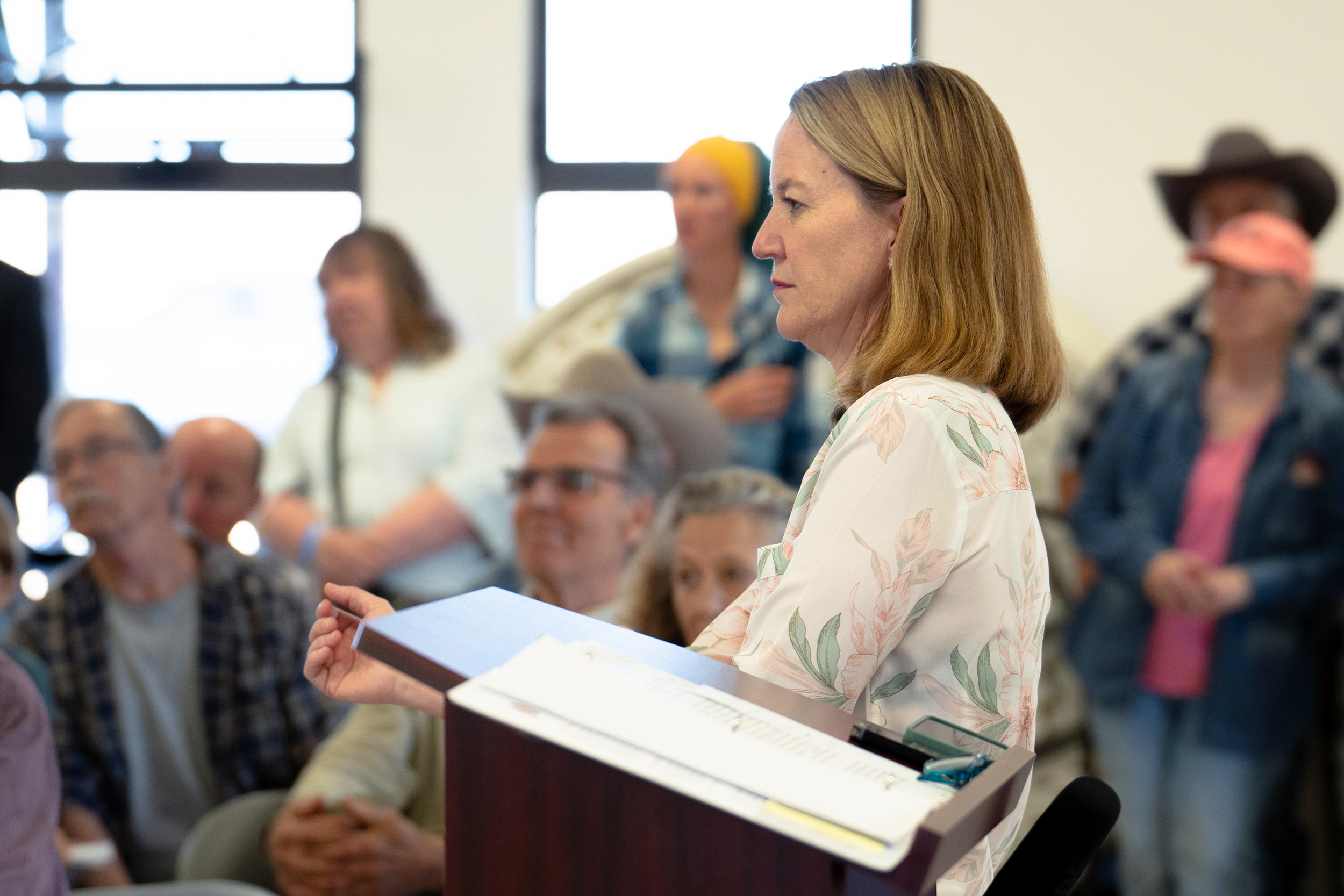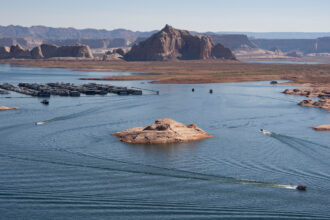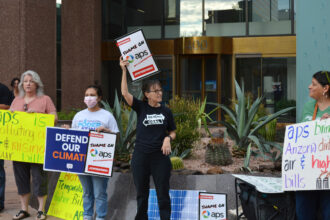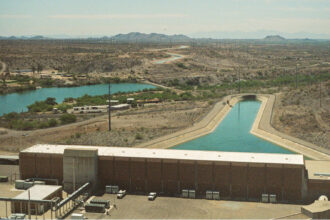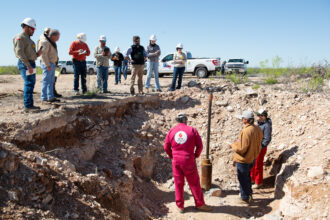If there’s an environmental or climate fight in Arizona, Attorney General Kris Mayes is likely involved.
Mayes has filed 25 lawsuits, many climate and energy related, against the Trump administration so far this year. She’s also intervened against plans to raise electricity rates by the state’s biggest utility, opposed plans to gut the state’s renewable electricity and energy efficiency standards and taken action to stop big corporations’ overuse of groundwater in rural Arizona.
In a year of major reversals of policies addressing climate change and its impacts at the local and federal levels, Mayes has been one of the few in Arizona advocating for continued investment in renewables and efforts to protect residents from the impacts of climate change. Her argument is simple: the job of an attorney general is protecting the state against “pure corporate greed” and actions contrary to the best interests of residents.
“When you have no leadership at the federal level, it makes it easier for bad actors to get away with things at the local level, but that also makes it more imperative for AGs and others to step up and protect people,” she said.
There’s no shortage of issues at the local level in Arizona.
Funding from the federal government for conservation work, environmental justice grants and Low Income Home Energy Assistance Program have been cut or paused.
The state’s utilities are regulated by the Arizona Corporation Commission (ACC)—on which Mayes previously served. All five commissioners are Republicans and are currently in the process of appealing the state’s renewable energy and energy efficiency standards. Mayes argues that is a threat to the state’s grid stability, which is essential during the hot summer months when access to air conditioning can be the difference between life and death.
The ACC is also considering a proposal from the state’s largest utility, Arizona Public Services, to raise electricity rates by 14 percent despite netting over $600 million in profits last year and walking back its climate goals this year. Tucson Electric Power is also considering a rate hike of 14 percent before the ACC, with Mayes also intervening in the case, arguing it’s “blatant corporate greed” from a billion-dollar company.
Arizona is also currently grappling with how to confront declining water availability across the state. Roughly 80 percent of the state has no groundwater regulations, leading large, typically agricultural operations to move into areas with aquifers and suck up huge amounts of the limited groundwater. That’s led local homeowners’ wells to run dry in many areas.
Action to do something about the declining aquifers has stalled in the Republican-controlled legislature for years, leading Mayes to sue one of the biggest farming operations—Fondomonte—which drew national attention in recent years for being a Saudi Arabian-owned company taking advantage of the state’s lax groundwater regulations. Since the company can’t be sued for its groundwater pumping, which is legal, she turned to the state’s nuisance laws.
Protecting consumers from rising electricity costs and protecting the state’s groundwater resources were top campaign issues for Mayes, who took office in 2023. Prior to her role as attorney general, Mayes was a reporter. She was elected to the Arizona Corporation Commission in 2003 and served there until 2010. She then served as a professor in Arizona State University’s School of Global Sustainability and taught a course on energy law for the Sandra Day O’Connor College of Law.
Inside Climate News sat down with Mayes to talk about her recent lawsuits against the federal government and actions regarding energy and water in Arizona. This interview has been edited for length and clarity.
WYATT MYSKOW: This year, you’ve filed and been allowed to intervene in APS’ case to raise electricity rates by 14 percent, as well as voiced opposition to the Arizona Corporation Commission’s plans to repeal clean energy and energy efficiency standards. Walk me through the threats you see those posing to Arizonans?
KRIS MAYES: All three of those things are going to increase electricity rates in Arizona. Arizona rate payers could be facing a triple whammy of terrible policies and decisions by the Corporation Commission if these go through. I’m going to do everything I can to stop it.
I’ll start with the rate case: First of all, Arizonans are already feeling squeezed by sky-high electric bills, and now APS is trying to jack them up even further.
This utility last year made more than $600 million in net income, and it’s outrageous that they’re asking for a more than 14 percent rate hike. I’m going to do everything I can to stand in the way of that and to protect consumers. That’s my job as attorney general, I believe.
It’s important to note also that this rate increase request by APS comes in the wake of three other rate increases they have already gotten recently: In 2024 APS increased rates by 8 percent; prior to that, another 8 percent in 2023 and they got a 4.5 percent increase in 2017, so Arizonans now already pay more for electricity than consumers in 38 other states. We are in a time when affordability is the top issue for Arizonans and Americans, and they simply cannot afford a 14 percent rate hike right now. [Mayes spoke with Inside Climate News prior to the ACC approving her request to intervene in Tucson Electric Power’s rate case, but her argument in that case is similar to the one against APS.]
Passing this rate increase or repealing [the state’s] renewable energy standard and the energy efficiency standard are actually going in the wrong direction of where we need to be going. We need to be increasing the amount of energy efficiency and renewable energy, which are the least-cost resource for consumers, and certainly the Corporation Commission should not be contemplating yet another rate increase for this utility that has already seen multiple rate hikes over the last few years and is raking in the profits. Frankly, I think it just demonstrates an instance of pure corporate greed, and most Arizonans see right through it.
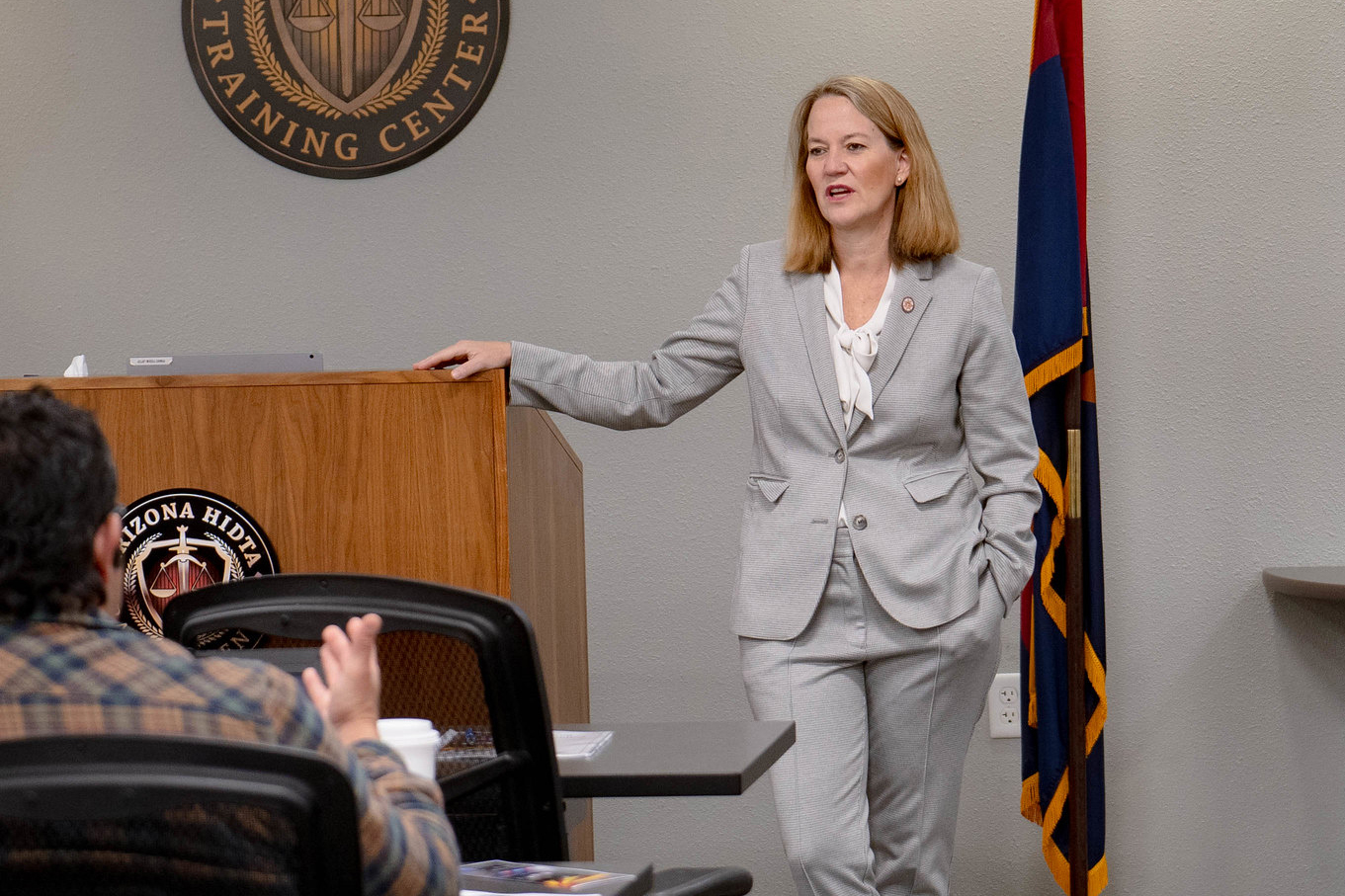
MYSKOW: Grid stability is obviously huge for Arizona. This is a place where it gets very, very hot in the summer, and if a home doesn’t have air conditioning, we’re looking at life-or-death consequences. How important are those considerations when we’re talking about repealing these rules and raising costs?
MAYES: Energy efficiency, in particular, helps to improve grid stability because it shifts power demand away from the hottest and most expensive hours of the day. It helps us reduce the electric load when it’s hottest in Arizona. That improves the reliability of the grid. It helps make sure that the utilities can provide electricity.
Retreating on the energy efficiency rules is moving in absolutely the wrong direction. Energy efficiency is also the least expensive form of energy, which is … that form of energy that we don’t have to produce. It’s also referred to as the “negawatt.” Energy efficiency is just an incredibly important resource that this commission seems to not care about anymore, which is really bonkers, to use a non-technical term.
The same goes for renewable energy. At a time when pretty much every other state is requiring their utilities to do more and more renewable energy, it would appear that our Corporation Commission is going to backtrack on renewable energy rules [that] require the utilities to produce more solar and wind energy. That just makes no sense.
Solar and wind and geothermal are the least expensive ways to provide electricity today in America. They also produce jobs, and Arizonans love to solarize their homes. Renewables are a way to keep ratepayers’ bills low and their lights on, and that’s something that we ought to be encouraging. Yet it looks like the Corporation Commission is about to allow the utilities to do whatever they want with regard to renewables and energy efficiency. We all know what happens when you do that.
I can tell you as a former corporation commissioner, if you let a monopoly utility do whatever it wants, it will do the most expensive thing, because they are incentivized through the rate-making formula to build big power plants. Building big power plants is expensive for customers, and that is a bad thing that should not be allowed by the regulator of these utilities.
MYSKOW: You mentioned you were previously a corporation commissioner. Both the renewable energy and efficiency standards were developed during your time there. Since then, what do you think has led to the current commission’s back track on these issues?
MAYES: I think a lot about this. When I coauthored both of these standards, I was a Republican. The renewable energy standard itself was passed under an all-Republican Corporation Commission. What I think has happened is that the Republican party is now dominated by the oil and gas industry, and their funders are largely in that space. I think right now the Republicans are taking their cues from Big Oil.
That’s really sad. That didn’t used to be the case. I was a Republican. I was very much in favor of renewable energy. I was very much in favor of allowing Arizonans to produce their own electricity by putting solar on their rooftops. And now this Corporation Commission seems to want to stand in the way of all of that.
Frankly, they believe in corporations over consumers, and that’s just too bad. We’re going to push back as hard as we can against this effort to dump the energy efficiency and renewable energy rules, because I don’t believe utilities should be able to do whatever they damn well please.
This story is funded by readers like you.
Our nonprofit newsroom provides award-winning climate coverage free of charge and advertising. We rely on donations from readers like you to keep going. Please donate now to support our work.
Donate NowMYSKOW: As Attorney General, you’ve made tackling energy costs and protecting renewables and energy efficiency standards priorities, but you’re also protecting Arizona’s groundwater and pushing back against the Trump administration’s cuts to various climate and environmental programs and funding. At a time when many at the state and federal level are walking back on these issues—or in the case of groundwater, making little progress—you continue to push for them. Why do these remain such big issues for you?
MAYES: I ran on a platform of doing everything I could to preserve Arizona’s groundwater and protect consumers against unreasonable utility rate hikes. I think as attorney general, I’m filling a gap right now in Arizona, where our regulators are failing to protect consumers. I wish I didn’t have to do that. Honestly, that’s really something that ought to be fulfilled entirely by the corporation commission.
On groundwater, I would say that that failure largely falls at the feet of the Republicans in the legislature who refuse to update our groundwater laws. It’s leading to incredibly unreasonable uses of water in rural Arizona that are harming entire communities, and so I have had to use nuisance law to protect entire neighborhoods and communities from having their wells dewatered by major industrial operations. We have nuisance law in Arizona and I’m going to fully utilize it, where I have to, to protect groundwater supplies and to make sure that Arizonans don’t lose the value of their homes because of these massive, unreasonable uses of water.
We sued the Saudi-owned corporation Fondomonte in western Arizona, which is using so much groundwater that it has dewatered the wells of many of its neighbors. We cannot afford to do stupid things with water anymore in Arizona.
MYSKOW: You’ve been part of tons of lawsuits against the Trump administration this year, many in regard to environmental and climate issues. Do you think those actions on the federal side to walk back and rescind climate and environmental protections is adding pressure on the side of the state governments and utilities to do the same?
MAYES: I think that it’s very likely … that part of what is going on right now is that there is no support at the federal level for clean energy and for protecting our groundwater supplies. When you have no leadership at the federal level, it makes it easier for bad actors to get away with things at the local level, but that also makes it more imperative for AGs and others to step up and protect people.
But it’s not a good situation to have a president who hates renewable energy, discourages energy efficiency and wants to strip LIHEAP away from low-income customers.
That’s all bad. It also runs counter to the president’s own voters who all across America believe in wind energy in places like Kansas and solar energy in places like Arizona and geothermal energy in places like California.
Republicans across this country have come to believe in clean energy and renewable energy and are benefiting from it. It just makes no sense for Donald Trump to be stripping the incentives away from these communities to do renewables. The Republicans are folding to Big Oil and big corporations instead of lowering rates for consumers.
About This Story
Perhaps you noticed: This story, like all the news we publish, is free to read. That’s because Inside Climate News is a 501c3 nonprofit organization. We do not charge a subscription fee, lock our news behind a paywall, or clutter our website with ads. We make our news on climate and the environment freely available to you and anyone who wants it.
That’s not all. We also share our news for free with scores of other media organizations around the country. Many of them can’t afford to do environmental journalism of their own. We’ve built bureaus from coast to coast to report local stories, collaborate with local newsrooms and co-publish articles so that this vital work is shared as widely as possible.
Two of us launched ICN in 2007. Six years later we earned a Pulitzer Prize for National Reporting, and now we run the oldest and largest dedicated climate newsroom in the nation. We tell the story in all its complexity. We hold polluters accountable. We expose environmental injustice. We debunk misinformation. We scrutinize solutions and inspire action.
Donations from readers like you fund every aspect of what we do. If you don’t already, will you support our ongoing work, our reporting on the biggest crisis facing our planet, and help us reach even more readers in more places?
Please take a moment to make a tax-deductible donation. Every one of them makes a difference.
Thank you,


